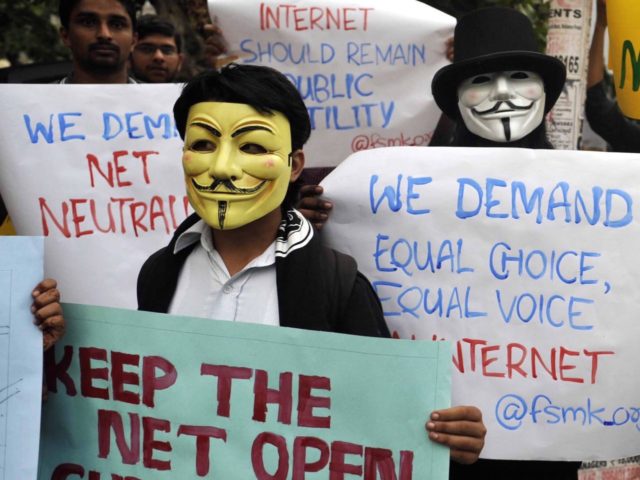With the rollback of the Obama Administration’s Net Neutrality almost complete, the Internet Association issued a manifesto to the now Republican-dominated FCC stating they intend to fight to bring back politicized regulations they worked so hard to implement.
The CEO and General Counsel of the Internet Association (IA) lobbying group, formed in 2012 by Google, Facebook, Amazon, Netflix and eBay, made an official Ex Parte Filling with the Federal Communications Commission (FCC) acknowledging that they met with new FCC Chairman Ajit Pai and his staff on April 11 to complain about the demise of the agency’s 2015 regulatory “Open Internet Order,” referred to as Net Neutrality.
The IA also complained about what they see as a nullification of broadening of Telephone Consumer Protection Act of 1991 consumer privacy rules to restrict the growth of Internet Service Providers (ISP).
Formed by the Communications Act of 1934 to regulate U.S. telephone service and radio broadcasts, the FCC over time gained regulatory control over all U.S. broadcast TV, cable satellite and the Internet communications. Although its commissioners are appointed by the president and confirmed by the U.S. Senate for five-year terms, they all must not have a financial interest in any FCC-related business, and only three commissioners may be members of the same political party.
But the FCC has often been highly politicized, because it controls almost all communications associated by 317 million Americans that are involved in 29.5 million private sector employers, 252 federal agencies and 89,000 state and municipal entities. With $358.3 million budget funded by consumer user fees, the agency is known for offering some of the highest federal salaries and paying for lots of outside consulting.
With President Obama and the Democrats sweeping the 2008 elections, Democrats gained the right to appoint the majority of FCC commissioners and its chairman.
According to Republican minority member Ajit Pai, the Democrat majority then secretly drafted a 332-page Net Neutrality plan, which gave authority for FCC regulators to micro-manage the Internet, extract billions in new consumer taxes, and enforce a fairness doctrine based on progressives’ idea of content that is honest, equitable and balanced.
Politico reported that Google and its allies at the Free Press and New America’s Open Technology were uniquely given copies of the draft Net Neutrality document by FCC Chairman Tom Wheeler, and later allowed to call the three Democrat commissioners and offer extraordinarily self-serving tweaks to the rules that were incorporated into the FCC document, just before the commissioners voted.
The FCC’s Net Neutrality regulatory scheme was extremely unfavorable for Internet Service Providers, like Verizon and Comcast, because it expanded standards of privacy to require ISPs to gain opt-in consent from customers before collecting sensitive data and to notify customers regularly about the different types of information they share with advertisers. It also made ISP’s broadband business subject FCC to regulatory pricing.
But under the provisions of the Open Internet Order, the Internet Association members’ customer pricing remained unregulated and they were specifically exempted from FCC opt-in and data-mining restrictions as “edge” companies.
The 2016 election of President Donald Trump, and the Democrats failure to win back control of the U.S. Senate, allowed the Republicans to gain control of the FCC on January 23 by appointing Ajit Pai as chairman. President Donald Trump then signed Senate Joint Resolution 34 on April 3 to terminate FCC Net Neutrality regulations under the Congressional Review Act.
Although the Internet Association claims that its “mission is to foster innovation, promote economic growth, and empower people through the free and open internet,” they seem determined to go all-out to try to protect Net Neutrality’s massive regulatory regime.

COMMENTS
Please let us know if you're having issues with commenting.